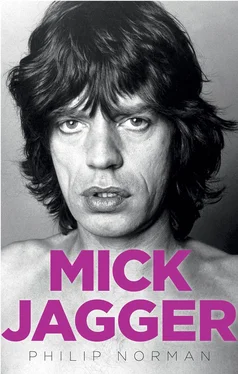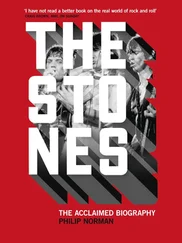CHAPTER SIX SIX ‘We Spent a Lot of Time Sitting in Bed, Doing Crosswords’ SEVEN ‘We Piss Anywhere, Man’ EIGHT Secrets of the Pop Stars’ Hideaway NINE Elusive Butterfly TEN ‘Mick Jagger and Fred Engels on Street Fighting’ PART II: THE TYRANNY OF COOL ELEVEN ‘The Baby’s Dead, My Lady Said’ TWELVE Some Day My Prince Will Come THIRTEEN The Balls of a Lion FOURTEEN ‘As Lethal as Last Week’s Lettuce’ FIFTEEN Friendship with Benefits SIXTEEN The Glamour Twins SEVENTEEN ‘Old Wild Men, Waiting for Miracles’ EIGHTEEN Sweet Smell of Success NINETEEN The Diary of a Nobody TWENTY Wandering Spirit TWENTY-ONE God Gave Me Everything Postscript Picture Section List of Searchable Terms Acknowledgements Also by Philip Norman Copyright About the Publisher
‘We Spent a Lot of Time Sitting in Bed, Doing Crosswords’ SIX ‘We Spent a Lot of Time Sitting in Bed, Doing Crosswords’ SEVEN ‘We Piss Anywhere, Man’ EIGHT Secrets of the Pop Stars’ Hideaway NINE Elusive Butterfly TEN ‘Mick Jagger and Fred Engels on Street Fighting’ PART II: THE TYRANNY OF COOL ELEVEN ‘The Baby’s Dead, My Lady Said’ TWELVE Some Day My Prince Will Come THIRTEEN The Balls of a Lion FOURTEEN ‘As Lethal as Last Week’s Lettuce’ FIFTEEN Friendship with Benefits SIXTEEN The Glamour Twins SEVENTEEN ‘Old Wild Men, Waiting for Miracles’ EIGHTEEN Sweet Smell of Success NINETEEN The Diary of a Nobody TWENTY Wandering Spirit TWENTY-ONE God Gave Me Everything Postscript Picture Section List of Searchable Terms Acknowledgements Also by Philip Norman Copyright About the Publisher
For any British band, the supreme challenge, and greatest thrill, is to ‘crack’ America. And few have failed quite so comprehensively as the Rolling Stones on their first US tour, in June 1964. The country would notice Mick soon enough, for better or worse, but during most of this initial three-week visit he was a barely distinguishable face among five, taking his equal share of disappointment and humiliation.
The Stones were not only following the triumphal footsteps of the Beatles four months earlier; they were also well to the rear in the so-called British Invasion of other UK bands who had stampeded after John, Paul, George and Ringo across the Atlantic and into the US charts. On the American edition of their first album, they were billed as ‘England’s Newest Hitmakers’, bracketing them with ‘soft’ pop acts they despised, such as Gerry and the Pacemakers, Billy J. Kramer and the Dakotas and the Dave Clark Five.
When the Beatles had arrived in New York in February, it was with an American No. 1 single, ‘I Want to Hold Your Hand’. But the Stones could offer no such impressive calling card. Their Beatle-bestowed UK hit, ‘I Wanna Be Your Man’, had been released on the London label, Decca’s US affiliate, but then abruptly withdrawn because its B-side was called ‘Stoned’, which in America meant drunk. It had then been rereleased, coupled with ‘Not Fade Away’, but even in a market supposedly ravenous for all British bands had barely scraped into Billboard magazine’s Top 50.
Thanks to Andrew Oldham, their transatlantic hosts had been primed to welcome them like a new strain of herpes. ‘Americans, brace yourselves!’ warned the flash circulated to newspapers and broadcast media by the Associated Press. ‘In the tracks of the Beatles, a second wave of sheepdog-looking, angry-acting Britons is on the way . . . dirtier, streakier and more disheveled than the Beatles . . .’ The Fab Four had flown off, carrying the whole nation’s hopes and even prayers like Neville Chamberlain bound for Munich or a Test cricket team for Australasia. Before the Stones left Heathrow Airport on 1 June an MP in the House of Commons expressed fears that they might do real harm to Anglo-American relations.
Even with this advance word-of-badmouth, it proved impossible for Oldham to whip up any major media coverage on the American side. Turndowns came from the NBC and CBS TV networks and, most slightingly, from The Ed Sullivan Show , which had clinched the Beatles’ conquest by beaming them to a national audience of more than 70 million. Paradoxically, the splashiest print coverage came from a quarter not normally interested in dirtiness and scruffiness – Vogue magazine. Diana Vreeland, the legendary editor of Vogue ’s American edition, agreed to publish a David Bailey photograph of Mick that every British magazine had rejected, despite never having heard of him or his band. ‘I don’t care who he is,’ she told Bailey. ‘He looks great, so I’ll run it.’
While calling the Stones ‘scruffier and seedier than the Beatles’, Vogue summed them up more pithily than any UK publication thus far, and with a hint of ladylike moist gussets that probably did Mick’s image more good in the long run than NBC, CBS and Ed Sullivan put together: ‘To the inner group in London, the new spectacular is a solemn young man, Mick Jagger, one of the five Rolling Stones, those singers [ sic ] who will set out to cross America by bandwagon in June. For the British, the Stones have a perverse, unsettling sex appeal, with Jagger out in front of his teammates. To women he’s fascinating, to men a scare . . .’
Since the Beatles’ reception by three thousand banner-waving fans, spilling over observation terraces and buckling plate-glass windows, the arrival of British pop bands at New York’s John F. Kennedy Airport had become a routine story to the city’s media. For the Stones, London Records laid on a markedly cut-price version of the now-familiar procedure, enlisting a few dozen teenage girls to scream dutifully as the band descended the aircraft steps after their economy-class flight, hiring a couple of Old English sheepdogs to represent kindred spirits, and providing a cake for Charlie Watts’s twenty-third birthday. At the press conference which followed, there was surprise, even some disappointment, when they proved to be politer and better spoken than most of the invaders who had come before. Who was the leader? one reporter asked. ‘We are . . . all of us,’ Mick lisped in his best LSE accent, without a frisson of Cockney.
The Beatles had spent their first New York landfall with their manager and considerable retinue in interconnecting luxury suites at the top of Manhattan’s grandest hotel, the Plaza, at Fifth Avenue and Central Park. The Stones spent theirs at the far-from-grand Hotel Astor in Times Square, bunking two to a poky room with their retinue (i.e., roadie Ian Stewart). To save money – an urgent consideration throughout the tour – Oldham slept on the office sofa of his friend and role model, Phil Spector.
Once his charges had checked into the Astor (which, miraculously, offered no objection), Oldham managed to feed the British press a story that, in true Beatle style, they had caused riots in midtown Manhattan and were imprisoned in their hotel by shrieking mobs. Unfortunately, agency photos which arrived home at the same time showed them exploring the Times Square district without a single hysteric in sight.
That is not to say that they went unnoticed. They had come to a land where every ‘manly’ man, from President Lyndon Johnson downwards, had hair cropped as close to the scalp as a convict’s but for a little toothbrushlike crest. The Beatles had been let off their hair because of some vague correlation with British classical theatre – Laurence Olivier as Richard III or Hamlet. But Rolling Stone hair meant only homosexuality, which – save in certain enlightened parts of Greenwich Village – was regarded as even more unnatural and detestable than it was in Britain. What should have been a magical first experience of New York for Mick and the others was marred by the typically forthright comments of passing New Yorkers: ‘Ya fuckin’ faggot!’ or ‘Look at that goddamn faggot!’ The fact that to English ears faggot still meant a rissole, or meat patty, did not make the experience any pleasanter.
Читать дальше












